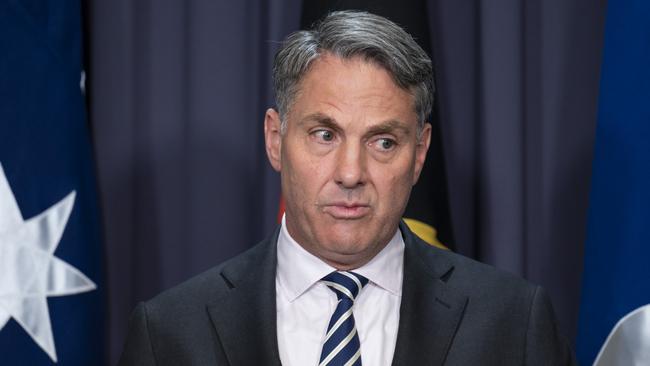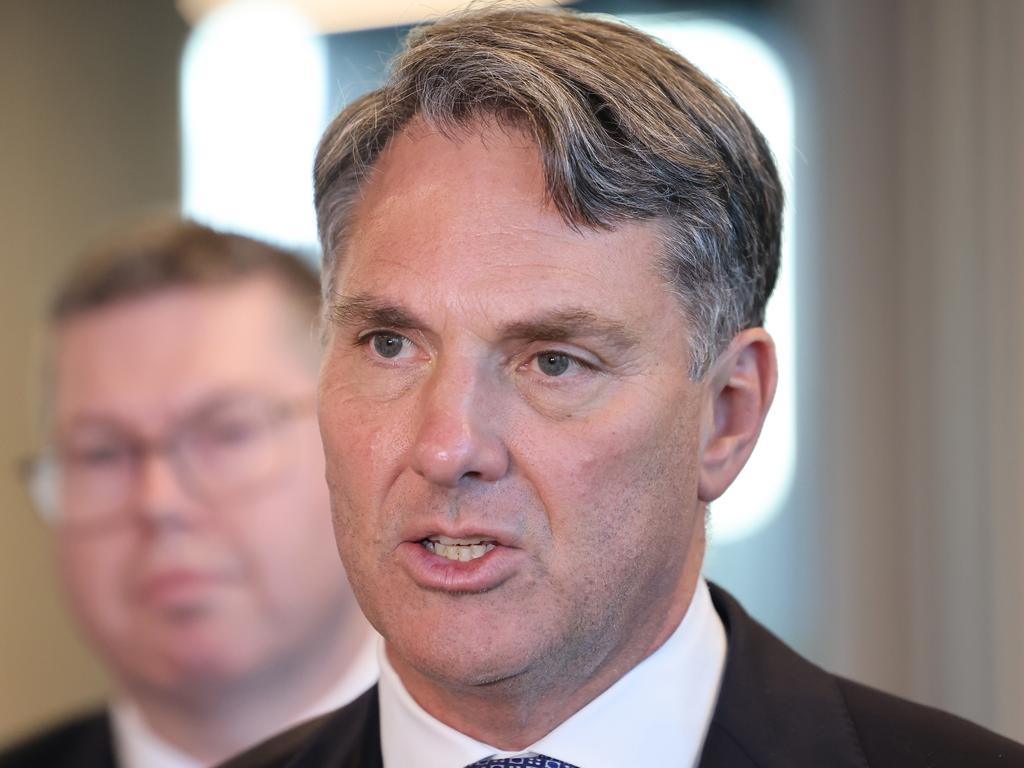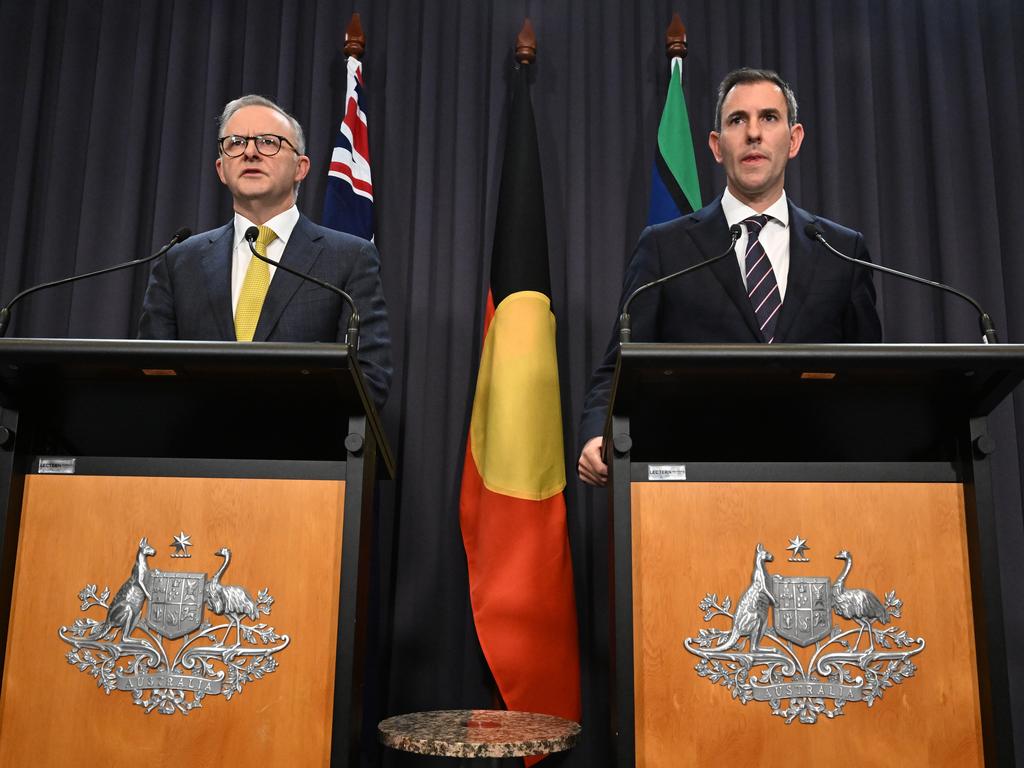
This is an encouraging, demanding, commitment. Australian defence specialises in grand announcements with mythical delivery dates. Marles’s ambition introduces the most novel concept ever into defence policy – accountability.
Most attention has rightly focused on plans to get nuclear-powered submarines under the AUKUS agreement with the US and Britain. But urgency is more important than grandiosity.
Marles will soon announce an independent chair, or two co-chairs, of a force posture/force structure review.
He explains its genesis: “The Defence Strategic Update in 2020 was a very important piece of work which made big observations which I agree with. The setting we’d had for a long time, that if anyone wanted to do us harm we’d be given 10 years warning, no longer applied. Now we are observing that we are within that 10 years window.
“The question that was left hanging is: if we’re really saying that, what does that mean about the way we’re going to behave? What are we going to do about it?”
Marles wants this review to set the pattern of defence for many years. But he also wants it to deal with the here and now. The government wants significantly more defence capability in the next five to seven years: “Greater projection and greater lethality are central to how we need to be considering capabilities. The review will need to look at immediate time frames we are facing and the kinds of capabilities we need in that time.”
Before the election, Anthony Albanese made an important speech at the Lowy Institute. He specifically nominated four options: putting Tomahawk missiles on our subs; reviewing the Hunter frigates program; examining upgraded weapons for offshore patrol vessels; and possibly building more air warfare destroyers.
Marles: “All of those (Albanese’s proposals) are alive.”
Anything new in Defence means new money or removing something else. The primary candidate for removal or reduction surely is the previous government’s decision to spend upwards of $40bn on heavy armour for the army, a capability irrelevant to the maritime security dangers Australia faces.
Marles makes an important clarification about what the government is committed to: “The funding commitment we’ve made is to 2 per cent (of gross domestic product) and to the funding envelope around the integrated investment plan.” That plan is worth $270bn over 10 years.
But here is the critical distinction. Marles says Labor is committed to the funding envelope, not to any specific piece of kit, or program, within that investment plan. He says: “The integrated investment plan, we need to look at that and see if it’s fit for purpose. That was at the heart of Anthony’s (pre-election) comments.”
In opposition, Labor foreshadowed a force posture review. Force posture means where we station defence assets. Strategic analysts generally argue for a greater military presence in the north and west of Australia. The Defence establishment, on the other hand, likes to centralise things in mega-bases, which are a bit cheaper, in or near big cities where it’s easier for Defence spouses to find jobs and the like.
Marles is now explicit that the review is to encompass force structure and he refers to it as “the force structure/force posture review”. He wants it to be as significant as Paul Dibb’s famous report in 1986, which Marles says established the framework for every defence white paper from then until the most recent in 2016.
In such a fundamental area as national defence, it’s worth going back to first principles. So I asked Marles: what is the military purpose of the ADF?
He says: “We want the most capable force that can place the greatest question mark in any adversary’s mind. We want a defence force which ensures that we are taken seriously as a nation and therefore creates the greatest strategic space for Australia. We need to be looking at sovereign capability. We need to protect the country, to defend the continent and defend our key interests. We are a trading nation, and our maritime approaches and our sea lanes are critical.”
That is an extremely useful statement of the ADF’s core military purpose. The acquisition of defence capabilities should fit clearly into that grid. Only one sentence in it gives me slight pause. The words “ensures that we are taken seriously as a nation” are just the sort of Jesuitical, slightly ambiguous formulation that can lead Defence to justify its most ridiculous programs.
Thus the false logic can be: tanks and heavy armour may be useful to support future US deployments in the Middle East. Such deployments are unlikely but possible. Having these capabilities – even in sub-strategic quantities – makes our army more credible, more interesting, to the Americans. That means they take us more seriously.
I don’t suggest that is Marles’s line of thought. But Defence has for decades proved truly gifted in pulling the wool over ministers’ eyes to justify the absurdity of our tanks. Veterans of national security cabinets cannot believe the way they were effectively hoodwinked in the past into supporting these irrelevant budget busters.
Marles plans for the separate submarine review to report by next March – the same time as the force structure review. Says Marles: “By March we hope to know five things: what type of submarine we are getting, the year we get it, how we fix the capability gap, what the cost will be and how we satisfy our nuclear non-proliferation obligations.”
I ask Marles whether it’s possible we would build a new conventional submarine – a son of Collins, perhaps – because the nuclear-powered boats will be so far away. He says: “We need to be looking at every option and we need to have an open mind about what we can bring to bear in capabilities.” He wouldn’t be drawn on specifics but insiders, not Marles, say the navy is so far winning the battle to talk the government out of a conventional submarine.
This arises in part because the government plans to build the nuclear submarines, except of course the nuclear reactors, in Australia. Marles explains: “We are going to need to develop over time the ability to build them in Australia. If we are going to get the whole eight in good time we’ll have to make our own contribution to the joint industrial base (of US, UK and Australia).”
Logic dictates that if we are building nuclear submarines here, we would not be able to build conventional submarines as well. No one seems to support the idea of getting a whole submarine fleet, conventional or nuclear, built overseas.
Similarly, it’s unconvincing to believe the US or Britain could base any of their nuclear subs in Australia as an interim measure. Being the base for nuclear subs requires almost as much technical and infrastructure development as building them.
I get the impression Marles is seized by the urgency of his task. He needs to be. No cabinet minister has a more important job.








Defence Minister Richard Marles has announced a much more difficult ambition than acquiring nuclear-powered submarines. In an extensive interview, he is committed to significantly increasing Australia’s defence capability within the next five to seven years.